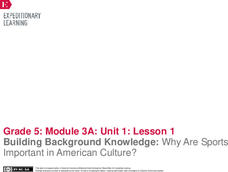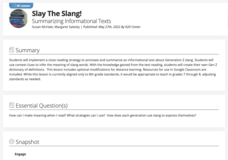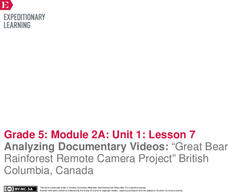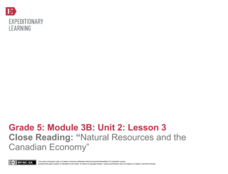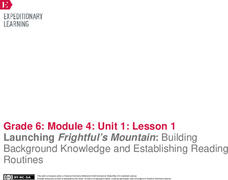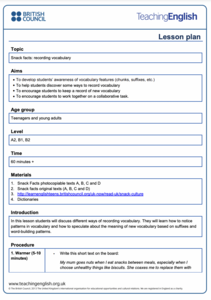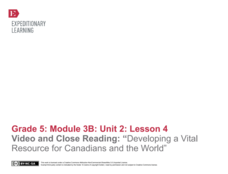Texas Education Agency (TEA)
Cognates (English III Reading)
Did you know that "30-40 percent of all words in English have a related word in Spanish?" This fact launches an interactive study of cognates appearing the same in English and Spanish. Learners demonstrate what they have learned about...
EngageNY
Building Background Knowledge: Why Are Sports Important in American Culture?
What makes sports so special to many Americans? Scholars ponder the question as they participate in a gallery walk, immersing themselves in images and texts about sports. Pupils also complete a vocabulary strategies anchor chart to...
Curated OER
Mini-Lesson Planning for Inferences
Making inferences and drawing conclusions is a key component to successful active reading. Encourage your class to use context clues and prior knowledge to infer different elements of a story, including the setting, plot, and character...
ESL Library
Mardi Gras
Learn about the festivity of Mardi Gras with a series of reading and writing assignments. As class members read a passage about the history of Mardi Gras and the way it's celebrated around the world, they answer comprehension questions,...
EngageNY
Establishing Routines for Discussing A Long Walk to Water (Chapter 6)
Middle schoolers use a reader's dictionary to locate words they do not know in chapter 6 of A Long Walk to Water. They then turn attention to gist and work on a Salva/Nya anchor chart to record what happens to the characters. Finally,...
K20 LEARN
Slay the Slang! Summarizing Informational Texts
Middle schoolers get hip to the jive with a lesson about slang. They closely examine examples of slang and use context clues to infer the meaning of the terms. Groups read and summarize an article about a teacher who created a Gen Z...
K20 LEARN
Things Are Lit at Thornfield: Jane Eyre
Jane Eyre offers scholars an opportunity to practice reading comprehension skills. Pairs are assigned a word from the text, use their prior knowledge, and consider the context, connotation, and denotation of the word to posit a...
EngageNY
Building Background Knowledge: Vietnam as a “Battleground in a Larger Struggle”
Read. Stop. Think. Scholars use a reading strategy to process the challenging text, "The Vietnam Wars." They read a paragraph and then stop to think about the text and its meaning. Readers then go on to work with partners and make notes...
EngageNY
Using Routines for Discussing A Long Walk to Water and Introducing Juxtaposition (Chapters 9 and 10)
Take a stand. Scholars consider what it means to take a stand in A Long Walk to Water. They complete an activity by taking a stand and moving to a labeled section of the room that matches their opinion. Readers then examine text features...
EngageNY
Analyzing Documentary Videos: “Great Bear Rainforest Remote Camera Project” British Columbia, Canada
Lights, camera, action! Viewers discuss a video about the Great Bear Rainforest Remote Camera Project. As they watch, they find the gist, determine the meaning of unknown words, and analyze the features of a documentary as an...
EngageNY
Relationships Between Key Scientific Concepts: What Causes Hurricanes?
A storm is brewing in the sea. Scholars complete multiple reads of How Does a Hurricane Form to determine gist, cause-and-effect relationships, and deepen vocabulary understanding. To finish, they complete graphic organizers to record...
EngageNY
Close Reading: “Natural Resources and the Canadian Economy”
Readers continue to learn how natural resources are important to Canada's economy. They read, annotate, and answer text-dependent questions about Natural Resources and the Canadian Economy. They then discuss key terms in the text.
Learning for Justice
Mary Church Terrell
Excerpts from an 1898 speech by civil rights activist Mary Church Terrell offers young scholars an opportunity to investigate how Black American women fought for civil rights long before Rosa Parks and the civil rights movement of the...
EngageNY
Launching Frightful’s Mountain: Building Background Knowledge and Establishing Reading Routines
Welcome to Frightful's Mountain. The teacher introduces scholars to the text Frightful’s Mountain by reading the first chapter aloud. Learners then talk with a partner about the text. The instructor models answering focus questions as...
Prestwick House
Vocabulary Lesson
Vocabulary instruction works best when taught within a larger context. A vocabulary activity builds connections by using synonyms to help learn the meaning of new words. This helps connect the words to prior knowledge and give them context.
TV411
Understanding Hard Words
Two strategies for decoding unfamiliar words are featured on a worksheet that illustrates how to use the parts of words (prefix, root, and suffix) and context to determine meaning. Examples are included as is a guided practice exercise.
Have Fun Teaching
Making Inferences (1)
Provide readers with an opportunity to practice drawing inferences by giving them this worksheet. Kids identify the text and author, record a sentence they believe infers rather than directly says, and then write the deeper meaning the...
K12 Reader
Earthquakes: Movement of the Earth's Crust
Readers use context to determine the meaning of words found in a short article about earthquakes and the movement of the earth's crust.
Texas Center for Learning Disabilities
Second-Grade Comprehension-Based Intervention
Help your youngsters find meaning in the text they read with this series of five intervention lessons. Offering explicit, step-by-step instructions for walking children through shared readings of leveled books, these...
British Council
Snack Facts - Recording Vocabulary
What's in a word? Scholars look at a sentence written on the board about snacks. They discuss unfamiliar terms and then record the new words by drawing a picture, writing a synonym, writing a translation, or creating a mind map. Pupils...
Compton Unified School District
How Can We Locate Places?
How can we locate places? Maps, of course! Expose second graders to the tools available in maps and discuss how these tools can help people find locations. Students also look at communities, including what makes a community and the...
EngageNY
Mid-Unit Assessment: Text-Dependent and Short Answer Questions: Excerpts from “A Limited Supply”
There's no such thing as an unlimited resource. Scholars complete a mid-unit assessment by reading A Limited
Supply. They answer text-dependent questions and complete a graphic organizer about key terms in the text.
EngageNY
Relationships Between Key Scientific Concepts: Planning What Causes Earthquakes
That is ground shaking news! Scholars read Earthquake in multiple reads to determine the gist, identify cause and effect relationships, and understand vocabulary. Learners complete graphic organizers to describe what happens before and...
EngageNY
Video and Close Reading: “Developing a Vital Resource for Canadians and the World”
Scholars watch Developing a Vital Resource for Canadians and the World to learn about the supplement potash that helps plants grow. They watch the video several times, completing a note catcher to record key ideas along the way. Pupils...



